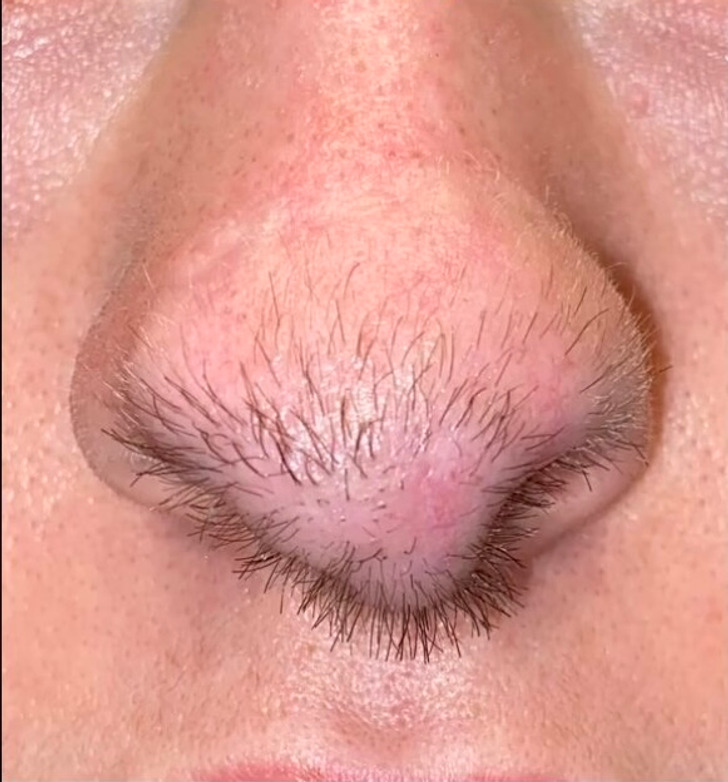A woman whose nose was ripped off in a vicious dog attack now has hair growing out of her skin grafts. What she’s going through is as odd and rare as it sounds, and it has left everyone shocked. Read on to discover her story.
She was attacked by her dad’s rescue dog.

In September 2022, Trinity Rowles’ life took a dramatic turn when her dad’s rescue dog attacked her. The dog, a Pitbull-Bulldog mix named Irish, had always been a gentle giant, more like a “great big teddy bear.” Trinity often looked after him, especially when her dad was away. But on that fateful day, after an argument with her dad, the tension in the house may have set Irish off.
Trinity remembers the attack as completely out of character for Irish. She explained that breeds like Irish are very emotional and can react unpredictably in high-stress situations. “Animals can only communicate in so many ways,” she said. When she started to walk away, Irish suddenly attacked, leaving her shouting that the dog was biting her nose.
Rowles has very blurred memories about the episode.

the hospital, and after that, her memories were a bit fuzzy.
The recovery had been long and painful.

Trinity Rowles was in the hospital for four days after the attack and then had to go back for surgery to fix her nose. At just 20 years old, she’s already had four surgeries and might need up to six more to repair her face. One of the surgeries involved a skin graft from her forehead and scalp, which even led to hair growing on her new nose, something she is struggling with every day.
The whole experience left Trinity with PTSD (post-traumatic stress disorder), causing her frequent flashbacks, trouble sleeping, and a need for therapy and medication. To help cover the costs, a fundraiser was set up, and so far, over $6,400 has been raised toward the $10,000 goal.
The attack has shaken Trinity’s confidence, making it hard for her to accept her new appearance. She’s now much more aware of the dangers dogs can pose, something she hadn’t thought about before. On top of everything, she’s struggling with the mental impact of having hair grow on her nose, forcing her to shave twice per week.
She now has a whole community following her journey on social media.

The 21-year-old has been sharing her recovery journey on TikTok, posting updates about her healing process, including the unexpected hair growth on her nose. In a recent video titled “Let’s remember to be nice to humans,” she reintroduced herself to her audience, many of whom know her from the attack by a family member’s dog.

In the post, she expressed her gratitude to those who have supported her from the beginning and took a moment to address her critics. She acknowledged her appreciation for her supporters and suggested that despite the negativity from some, her experience has allowed her to connect with others who have faced similar situations.
Here, we explain why some hair can grow in extremely odd ways.
Abandoned And Trapped In Deep River, The Elderly Dog started crying When The Volunteer Approached To Caress Him
In the heart of Los Angeles, a tale unfolded that touched the souls of many—a tale of abandonment, resilience, and compassion. It began with a simple phone call, one that sparked a mission of hope and redemption for a lonely soul trapped in the depths of the city’s river.

The call came to Hope in the Paws, a beacon of light for animals in distress. On the other end of the line was a plea for help, a desperate cry for assistance for an elderly dog stranded in the labyrinthine maze of the Los Angeles River. For weeks, the community had rallied around the dog, providing what little sustenance they could offer, but they knew that without intervention, his fate would be sealed.

With urgency in their hearts and determination in their eyes, the volunteers of Hope in the Paws sprang into action. But as they approached the river’s edge, they were met with a sight that tugged at their heartstrings—the elderly dog, once proud and majestic, now reduced to a trembling, frightened creature, his eyes betraying the fear and uncertainty that gripped his soul.

Undeterred by the enormity of the task before them, the volunteers pressed on, fueled by a singular purpose—to bring comfort and salvation to this vulnerable being. With each step closer, they could hear the soft whimpering of the dog, a haunting melody that echoed through the silence of the river.

But then, something miraculous happened. As one of the volunteers extended a hand of kindness towards the dog, offering nothing but love and compassion, the trembling ceased, and the fear began to ebb away. In that moment, amidst the chaos and turmoil of the river, a bond was formed—a bond forged in the crucible of adversity and sealed with the simple yet profound language of empathy.

With gentle hands and tender words, the volunteers lifted the elderly dog from his watery prison, cradling him in their arms as they made their way to safety. And as they emerged from the depths of the river, they were greeted by the warm embrace of the community, their faces alight with gratitude and hope.
The rescue of Peggy the German Shepherd was not just a triumph of human kindness—it was a testament to the power of compassion and the resilience of the human spirit. And as Peggy took her first tentative steps towards a new life, she carried with her the unwavering support of all those who had rallied behind her—a reminder that no soul is ever truly alone as long as there are hearts willing to open and hands ready to help.
So here’s to Hope in the Paws, an organization built on the belief that every life is worth saving and every creature deserving of love. Thank you for your tireless dedication, your boundless compassion, and your unwavering commitment to making the world a better place—one rescue at a time.
And to Peggy, may your journey be filled with warmth and joy, and may you always know that you are loved beyond measure. You may have been abandoned and trapped in the depths of a river, but today, you are free—free to run, free to play, and free to bask in the boundless love that surrounds you.
This is the story of Peggy the German Shepherd—a story of hope, redemption, and the enduring power of love. And as her tale spreads far and wide, may it serve as a beacon of hope for all those who find themselves lost and alone in the world.



Leave a Reply